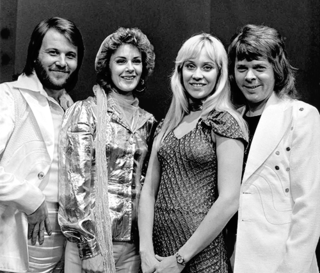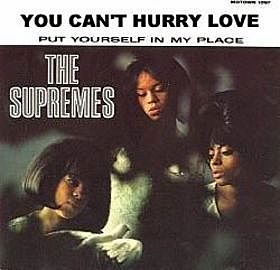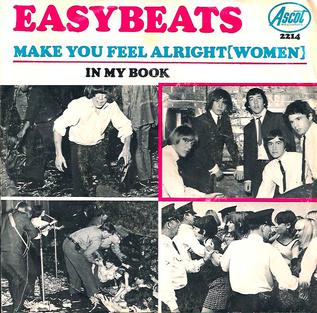
ABBA are a Swedish pop supergroup formed in Stockholm in 1972 by Agnetha Fältskog, Björn Ulvaeus, Benny Andersson, and Anni-Frid Lyngstad. The group's name is an acronym of the first letters of their first names. They became one of the most commercially successful acts in the history of popular music, topping the charts worldwide from 1974 to 1982. ABBA won the Eurovision Song Contest 1974, giving Sweden its first triumph in the contest. They are the most successful group to have taken part in the competition.

The Seekers are an Australian folk-influenced pop quartet, originally formed in Melbourne in 1962. They were the first Australian pop music group to achieve major chart and sales success in the United Kingdom and the United States. They were popular during the 1960s with their best-known configuration as: Judith Durham on vocals, piano, and tambourine; Athol Guy on double bass and vocals; Keith Potger on twelve-string guitar, banjo, and vocals; and Bruce Woodley on guitar, mandolin, banjo, and vocals.

Johnny Young is a Dutch Australian singer, composer, record producer, disc jockey, television producer and host. Originally from Rotterdam, Netherlands, his family settled in Perth, Western Australia in the early 1950s. Young had a career in the 1960s as a pop singer and had a number one hit with the double-A-side, "Step Back" and "Cara-lyn" in 1966, and his profile was enhanced by a concurrent stint as host of the TV pop program The Go!! Show. As a composer, he penned number one hits, "The Real Thing" and "The Girl That I Love" for Russell Morris, "The Star" for Ross D. Wyllie and "I Thank You" for Lionel Rose and the hit single "Smiley" for Ronnie Burns. After his pop career ended he returned to TV where he presented and produced the popular television show, Young Talent Time, which screened on Network Ten from 1971 to 1988 – it launched the careers of numerous teen pop stars especially Jamie Redfern, Debra Byrne, Dannii Minogue and Tina Arena, as well as Jane Scali, Sally Boyden and Karen Knowles – typically each episode closed with a sing-along rendition of The Beatles song "All My Loving".

The Easybeats were an Australian rock band that formed in Sydney in late 1964. Considered one of the most important rock acts in Australia during the 1960s, they enjoyed a level of success that in their country rivaled the Beatles and became the first Australian rock act to score an international hit with the 1966 single "Friday on My Mind", as well as one of the few in Australia to exclusively write and record original material.

Fine Young Cannibals were a British rock music band formed in Birmingham, England, in 1984, by bassist David Steele, guitarist Andy Cox, and singer Roland Gift. Their self-titled 1985 debut album contained "Johnny Come Home" and a cover of "Suspicious Minds", two songs that were top 40 hits in the UK, Canada, Australia and many European countries. Their 1989 album, The Raw & the Cooked, topped the UK and US album charts, and contained their two Billboard Hot 100 number ones: "She Drives Me Crazy" and "Good Thing".

"Sunshine Superman" is a song written and recorded by Donovan. The "Sunshine Superman" single was released in the United States through Epic Records in July 1966, but due to a contractual dispute the United Kingdom release was delayed until December 1966, where it appeared on Donovan's previous label, Pye Records. The "Sunshine Superman" single was backed with "The Trip" on both the United States and United Kingdom releases. It has been described as "[one of the] classics of the era," and as "the quintessential bright summer sing along".

"You Can't Hurry Love" is a 1966 song originally recorded by The Supremes on the Motown label.

Underneath the Colours is the second album by Australian rock group INXS. It was released in Australia in 19 October 1981 on the Deluxe Records label and reached No 15 on the Australian album charts.

George Redburn Young was an Australian musician, songwriter and record producer. He was a founding member of the bands the Easybeats and Flash and the Pan, and was one-half of the songwriting and production duo Vanda & Young with his long-time musical collaborator Harry Vanda.

Evelyn "Champagne" King is an American singer, songwriter, and record producer. She is best known for her hit disco single "Shame", which was released in 1977 during the height of disco's popularity. King had other hits from the early through the mid–1980s including; "I'm in Love" (1981), "Love Come Down" (1982) and "Your Personal Touch" (1985).
Stephen Carlton Wright, better known by his stage name Stevie Wright; formerly billed as Little Stevie, was an English-born musician and songwriter who has been called Australia's first international pop star. During 1964–69 he was lead singer of Sydney-based rock and roll band the Easybeats, widely regarded as the greatest Australian pop band of the 1960s.

"Forever Young" is a song from German synthpop recording act Alphaville's 1984 debut album of the same name. The single was a strong hit in Scandinavia and in the European German-speaking countries in the same year.

"Our Day Will Come" is a popular song composed by Mort Garson with lyrics by Bob Hilliard. It was recorded by American R&B group Ruby & the Romantics in early December, 1962, reaching number one on the Billboard Hot 100.
"Young Love" is a popular song, written by Ric Cartey and Carole Joyner, and published in 1956. The original version was recorded by Ric Cartey with the Jiva-Tones on November 24, 1956. It was released in 1956 by Stars Records as catalog number 539 and one month later by RCA Records as catalog number 47-6751. Cartey's version never charted.
Judith Anne Stone AM is an Australian pop and country music singer. For much of the 1960s she was a regular performer on the music variety Bandstand, Stone's top 20 singles on the national charts are "I'll Step Down", "4,003,221 Tears from Now", "Born a Woman" and "Would You Lay with Me". On the Queen's Birthday Honours List of June 2006, Stone was awarded a Member of the Order of Australia, with the citation, "For service to the community as an entertainer at fundraising events for a range of charitable organisations, and as a singer."

It's 2 Easy is the second studio album Australian rock band the Easybeats. Released on 24 March 1966, the album featured four hit singles; "Wedding Ring", "Sad and Lonely and Blue", "Women " and "Come And See Her".

Volume 3 is a studio album by the Australian rock band The Easybeats, released on 3 November 1966. It was the third and final album from the group recorded in Australia before relocating to England.

"Goin' Back" is a song written by Gerry Goffin and Carole King in 1966. It describes the loss of innocence that comes with adulthood, along with an attempt, on the part of the singer, to recapture that youthful innocence. The song has been recorded by many artists, including Dusty Springfield, Goldie Zelkowitz, the Byrds, Elkie Brooks, Blerta, Ricky Ross, Marianne Faithfull, Bill Drummond, Nils Lofgren, Freddie Mercury, the Move, the New Seekers, the Pretenders, Diana Ross, Richard Thompson, Phil Collins, The Icicle Works and Bon Jovi, as well as by Carole King herself.

"You Better Run" is a song by the Young Rascals. Written by group members Eddie Brigati and Felix Cavaliere, it was released as the band's third single in 1966 and reached the top 20 in the United States.

"Women " is a song written by Stevie Wright and George Young. It was originally recorded by the Australian rock group the Easybeats in 1966, whose version reached #4 on the Australian charts. It was the group's debut single in the United States, released on the United Artists Records subsidiary label, Ascot Records under the title "Make You Feel Alright (Women)".

















